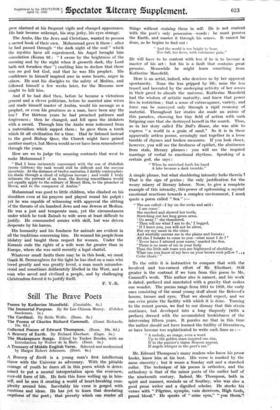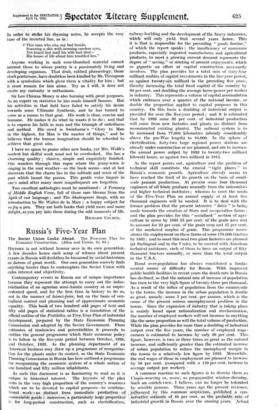Still The Brave Poets
Poems by Katherine Mansfield. (Constable. 6s.) The Cardinal. By ifrida Wolfe. (Bann. Cs.) The Shakespeare SongS. Edited by TUcker Brooke, With an Introduction by Walter la Mare. (Dent. 5s.) . _ . . A Treasury of Middle English Verse: Selected and modernized by Margot Robert- Adamson. (Dent: ' 6s;)
A Bravery of Earth is a young man's first intellectual throw with the Universe as adtersarY. With the pitiable courage of youth he dares all in this _poem _which is deter-. mined to put a mental -interpretation upon the ever-new; ever-old force. of life. He feels this force welling .up in him- self, and he sees it Creating. a world of heart-breaking_ com- plexity around him,. Inevitably his verse is gorged with emotions and iderti. He has yet to leern tliat -desolating emptiness of - the poet ; that poverty - which can render .all.
things without staining them in self. He is not content with the poet's only possession—words : he must possess the Earth, and master it through his senses. It cannot be done, as he begins to find out : " And the world is too bright to boar, Too full, too keen, with exhilarate pain."
He will have to be content with less if he is to become a.` master of his art : but his is a fault that contains great promise. Meanwhile he might learn something from- Katherine Mansfield.
Here is an artist, indeed, who deceives us by her apparent spontaneity. None the less. gripped by life, none the less
teased and lacerated by the unsleeping activity of her senses in 'their greed to absorb the universe, Katherine Mansfield
had the wisdom of artistic maturity, and knew that power lies in restriction ; that a sense of extravagance, variety, and force can be conveyed only through a rigid economy of material. Throughout her stories she made an axiom of this paradox, choosing her tiny field of action with such fatiguing care that she destroyed herself in the search. Thus, as in her story called The Doll's House, she was able to express " a world . in a grain_ of sand." So it is in these apparently artless poems, seemingly cast together in a loose tumble of rhymes and broken measures. If you look closer, however, you will see the freshness of epithet, the abstinence from stale, literary phrases : you will see the inspired marriage of verbal to emotional rhythms. Speaking of a certain god, she says :
" When he stretched forth his hand A lake became a dark tremble."
A simple phrase, but what shuddering intensity lurks therein t That is the sign of genius ; the only justification for the , weary misery of literary labour. Now, to give a -eomplete example of this intensity, this power of epitomizing a myriad emotional reactions towards a complex environment, I must quote a poem called " Sea " :—
" The sea called--I lay on the rocks and said : ' I am come.'
She mocked and showed her teeth, Stretching out her long green arms. Go away ' she thundered. Then tell me what I am to do,' I begged.
If I leave you, you will not be silent, But cry my name in the cities And wistfully entreat me in the plains and forests ; - All else T forsake to come to you—what must I do
` Never have I uttered your name,' snarled the Sea.
There is no more of me in your body Than the little salt tears you are frightened of shedding.
What-can you know of 'my loVe on your brown rock pillow 1 • Coihe elosor.," • • - ' - - • To the critic it is instructive to compare that with the involved and too-earnest effort of Mr. -Eberhart. Still. greater is the contrast if we turn frOm this. poem to Mr.: Carru-nell's work. ThiS author also is earnest, and his work is dated, prefaced and annotated with a gravity that makes one wonder. The poems range from 1911 to 1929, the early ones consisting of the usual young stuff about the Beloved's bosom, tresses and eyes: That we should expect,- and we can even praise the -facility•with which it is done. Turning to the recent poems, we find to our dismay that this strain' Continues, but developed into a long rhapsody (with a Preface) dressed with the accumulated bookishness of the intervening fifteen years. It puzzles me that in this time the author should not have learned the futility of literariness, or have become too sophisticated to write such lines as :—
" A melody, an image, even a word Up to the golden stars inspired can rise, If to the painter's vision Heaven appear, If angels whisper in the poet's ear.'
Mr. Edward Thompson's many readers who know his prose
books, know him at his best. His verse is marked by the Same sincerity.; but it wears a Sunday suit`.and a starched Collar. The technique of his poems is orthodox, and the Orthodoxy is that of the minor poets of the earlier half of . the nineteenth century. Indeed, Mr. Thompson, both in spirit and manner, reminds us of Southey, who was also a good prose writer and a dignified scholar. He stocks his Verses- with " Pilgrims, nymphs, vain deeeiVers, High Gods, - proud_ blood." He speaks of " mine eyes," " yon thorn.", • In order to strike his rhyming notes, he accepts the easy tune of the inverted line, as in :
This man who sits, my bed beside, Scanning a skit with seeming-careless eyes, Yet heard last mail his wife had died- - His house of life about him tumbled lies."
Anyone working in such over-thumbed material cannot interest those to whom poetry is a passionately living and developing organism. That drab, rubbed phraseology, those
stock poeticisms,-have doubtless been kindled by Mr. Thompson with a symbolism which gives them a vitality for him ; but it must remain for him alone. Try as I will, it does not excite my curiosity ar enthusiasm.
Sir Leo Chiozza Money is also burning with great purposes.
As an expert on statistics he has made himself famous. But his activities in that field have failed to satisfy his desire towards some Ultimate Synthesis, and he has turned to verse as a means to that goal. His work is clear, concise and humane. He makes it do what he wants it to do ; and that is to express his faith in man and the triumph of orderliness and method. His creed is- Swinburne's "Glory to Man in the highest, for Man is the master of things," and he believes that the human imagination should be schooled to achieve that great aim.
I have no space to praise other new books, yet Mrs. Wolfe's modest but skilful work must not be overlooked. She has a charming quality ; elusive, simple and exquisitely finished. One wanders through this copse where the jenny-wren is singing in the cool weather—so the book seems—and at last discovers that the charm lies in the solitude and sense of the past which haunt the poems. This gentle voice lingers in one's mind after many more magniloquent are forgotten.
Two excellent anthologies must be mentioned : A Treasury of %Middle English Verse, full of those rare blooms from the April of our language ; and The Shakespeare Songs, with an introduction by Mr. Walter de la Mare ; a happy subject for so fey a pen. They are both books that yield more and more delight, as you pry into them during the odd moments of life.
RICHARD CHURCH.



























































 Previous page
Previous page